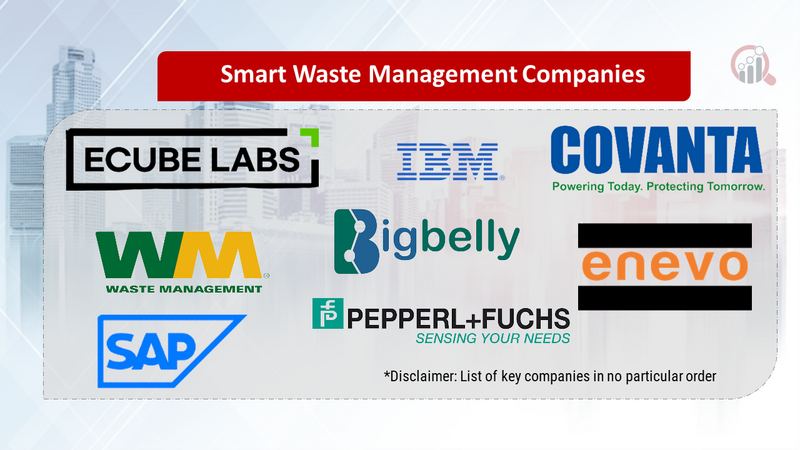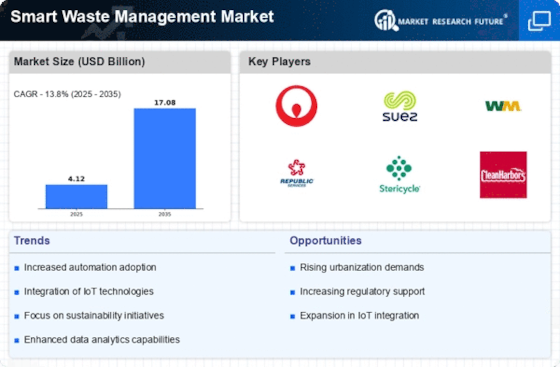Top Industry Leaders in the Smart Waste Management Market
 Competitive Landscape of Smart Waste Management Market:
Competitive Landscape of Smart Waste Management Market:
The global smart waste management market is projected to experience significant growth in the coming years, driven by increasing focus on sustainability, growing adoption of smart cities initiatives, and rising awareness about waste management challenges. This burgeoning market presents a fertile ground for various players, attracting established companies as well as emerging startups.
Key Players:
- IBM Corporation (US)
- SAP SE (Germany)
- Enevo (Finland)
- Bigbelly, Inc. (US)
- Waste Management, Inc. (US)
- Ecube Labs Co., Ltd.(South Korea)
- Covanta (US)
- Pepperl+Fuchs Group (Germany)
- OnePlus Systems Inc (US)
- Urbiotica (Spain)
Strategies Adopted by Key Players:
- Focus on Research and Development: Companies are investing heavily in R&D to develop innovative smart waste management solutions, including AI-powered sensors, advanced data analytics tools, and waste-to-energy technologies.
- Partnerships and Collaborations: Strategic partnerships with waste management companies, technology providers, and municipal authorities are becoming increasingly common, allowing companies to expand their reach and access new markets.
- Expansion of Product Portfolio: Key players are expanding their product portfolio to offer comprehensive smart waste management solutions encompassing various components, from hardware sensors to software analytics platforms.
- Focus on Sustainability: Companies are highlighting the environmental benefits of their smart waste management solutions to attract environmentally conscious customers and align with global sustainability goals.
- Localization and Customization: Companies are adapting their solutions to specific regional needs and regulations, allowing them to cater to diverse market demands.
Factors for Market Share Analysis:
- Product Portfolio: Breadth and depth of smart waste management solutions offered, including hardware, software, and services.
- Market Share: Geographic reach and market penetration in different regions.
- Financial Performance: Revenue, profitability, and market valuation.
- Innovation: Investment in R&D, development of new technologies, and patent portfolio.
- Customer Satisfaction: Brand reputation, customer reviews, and market recognition.
- Sustainability: Commitment to environmental sustainability and green technologies.
New and Emerging Companies:
- Startup ecosystem: A thriving startup ecosystem is driving innovation in the smart waste management market. These startups are often agile and focused on specific niche solutions, making them strong contenders in the competitive landscape.
- Mergers and Acquisitions: Mergers and acquisitions are becoming increasingly common, allowing established players to expand their capabilities and acquire emerging technologies.
- Focus on specific segments: New companies are emerging to cater to specific segments of the smart waste management market, such as waste-to-energy solutions, organic waste management, and hazardous waste disposal.
Current Company Investment Trends:
- Investment in data analytics: Companies are investing heavily in data analytics platforms that can convert collected waste data into actionable insights for optimizing waste collection and resource management.
- Internet of Things (IoT) integration: Smart waste sensors and platforms are increasingly being integrated with IoT technologies to create an interconnected network for efficient and data-driven waste management.
- Artificial intelligence (AI) applications: AI is being used to develop smart waste management solutions capable of predicting waste collection needs, optimizing routes, and identifying potential problems.
- Cybersecurity awareness: As smart waste management systems become more interconnected, cybersecurity measures are becoming increasingly important to protect sensitive data and ensure system integrity.
- Focus on circular economy: Companies are developing solutions that promote the circular economy, such as waste-to-energy technologies and waste recycling initiatives.
Latest Company Updates:
July 2023 - The city corporation at Thiruvananthapuram will be implementing solid waste management system that is digitally integrated as a part of the Smart City project. In fact, the civic body that has suffered often from data documentation and shoddy monitoring considering waste management is likely to benefit largely from the system. According to the tender document, this project will envisage a waste collection & transportation system which utilizes GPS-enabled cars for tracking collection routes and optimizing pick-up schedules. A digital platform will also be there that will enable residents in reporting waste issues and tracking their disposal & waste collection’s status along with a feedback system which allows citizens in reporting their satisfaction and giving suggestions for improvements.
June 2023 - Rubicon has lately announced the launch of the smart city partnership for improving efficiency in the solid waste collection operations. This smart city product will help in digitizing the CCD’s waste collection transitioning solid waste management division’s drivers from manual routing and paper-based maps to Rubicon’s software. Now supervisors and managers across the department have real-time insight into route progress, the service completion & any issue at the curb. The drivers can help with one another’s routes during a breakdown and get updates to the routes when they happen. The department leaders can utilize analytics based on all the data for identifying issues and creating solutions. All such improvements will allow the Department to offer more effective and efficient curb side collection service. This alliance is a testament to the overwhelming commitment of Denver to efficiency and innovation to deliver their residents with core public services.










